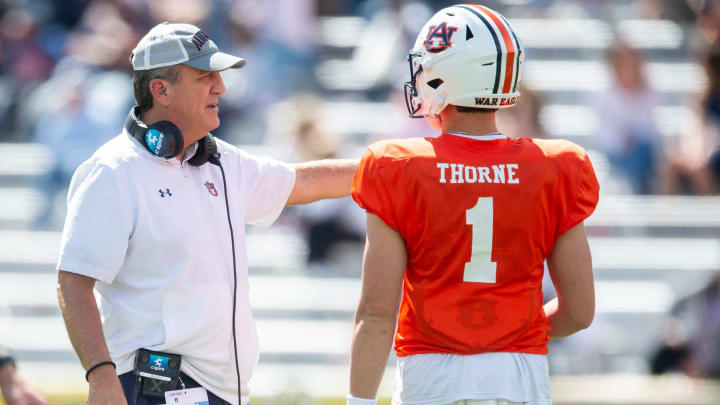Will New Communication Lead to Better QB Play for Auburn Tigers?

In April, the NCAA pushed through a rule change that will allow sideline to helmet communication in 2024.
When you cast your mind back and realize the NFL embraced such technology way back in 1994, it's fairly obvious that coaches like Hugh Freeze of the Auburn Tigers are now playing catch up.
"We don't know. We're fixing to go try it out here in a minute," Freeze said of trying out the new helmet tech last week. "I'm probably going to throw the helmet to helmet communication on the ground a few times today just because it's new to me. But we're certainly going to try to use it and find out how you can use it to be advantageous to you. It wouldn't shock me if you see more teams getting in the huddle because it really doesn't change anything if you're not in the huddle. You still have to signal into the receivers and other people if you're a no-huddle team. So yeah, we're kind of exploring some of that."
Perhaps some of the older fraternity of college coaches will be less inclined to be totally enthusiastic about embracing the new way of communicating.
It sounds like Freeze believes that a lot of the old way of conveying play calls to his quarterback Peyton Thorne will remain unchanged in a variety of different situations.
Working in their favor will be the experience that Thorne will bring to the process of adapting, plus, doing some mock runs during summer practice sessions will be crucial.
On the flip side, college coaches with some NFL experience should have the edge because they're well versed in working with helmet communication when under pressure.
Getting a handle on how things are going to look should iron out some of the initial teething problems, but whether or not it speeds up games as is the bold intention remains to be seen.
Coach Freeze might feel he might be able to work things out and gain a competitive advantage moving forward.
Reassuringly, Freeze sounded a lot more confident that the use of tablets by all concerned won't hold any terrors for him or his team on account of a plan already crystalizing - he's no tech dinosaur after all,
"The tablets on the other hand, I do think that there has to be a system for that, one which we've talked thoroughly through," Freeze declared. "And now that analysts can be a part of the instruction process, that certainly helps where they're having the tablets that are tagging plays in the series where there's not a lot of wasted time and your team comes to the sideline of what we need to really address. And so we do have a plan in place for that.
"I still don't truthfully know exactly how we're going to use the helmet to helmet. I mean, I know I will. I can talk to Payton or our quarterbacks up to 15 seconds, but still not quite sure what all that means yet for us."
When you understand the extra costs the NCAA were always against absorbing when it came to helmet comms, you better believe the powers that be want everyone to fully embrace using it moving forward.
Earlier this offseason, Freeze detailed how offensive coordinator Derrick Nix and quarterbacks Coach Kent Austin would be actively involved in calling plays on gameday, therefore, you can be darn sure they don't want to get their signals crossed.
In the final analysis, it's up to Freeze and Co. to find out what really works for them when the bullets start flying, and exploit it thereafter.
